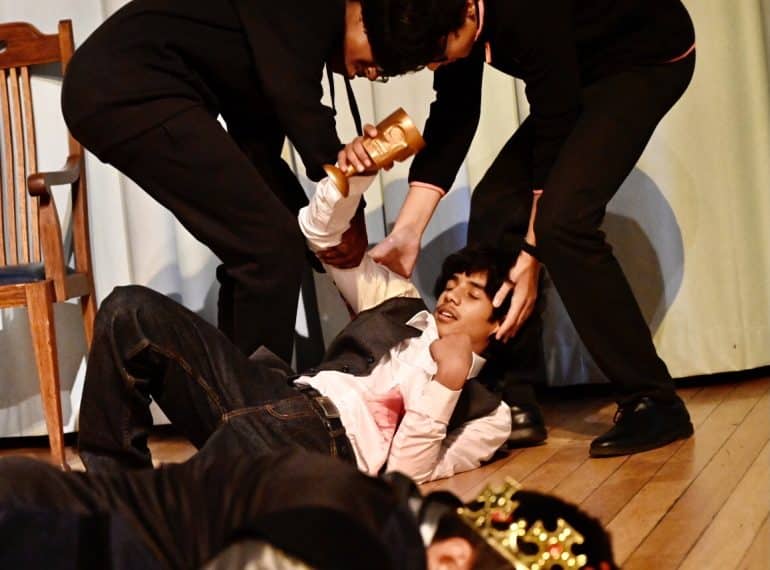
With theatres across the land closed because of Covid-19, QE boys revelled in a rare chance to see live drama as part of this year’s Shakespeare Schools Festival.
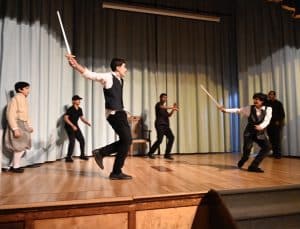 Year 9 Drama Club members performed an abridged version of Hamlet – and thanks to QE’s year group bubble system, their entire year were able to watch the performance in the Main School Hall.
Year 9 Drama Club members performed an abridged version of Hamlet – and thanks to QE’s year group bubble system, their entire year were able to watch the performance in the Main School Hall.
Afterwards, Assistant Head (Pupil Involvement), Crispin Bonham-Carter, praised the cast for putting on such an engaging production: “They told the story clearly, and it was genuinely moving. Something we will all treasure.”
The boys have spent weeks preparing for the Shakespeare School Festival (SSF). Their work included a special workshop before half-term led by Brian Mullin, an Artistic Associate with the Coram Shakespeare Schools Foundation (the organisation which runs the festival) and Gavin Molloy, of RM Drama (the company which provides drama direction for the School).
In normal years, QE boys join other schools to give their abridged performances at a special SSF evening at the Arts Depot in Finchley.
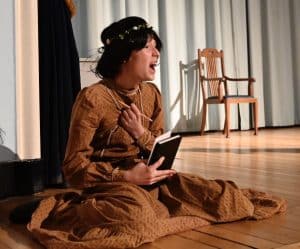 This year, it had originally been planned to live-stream performances, but in the end it was decided simply to have the boys perform live at the School, with Mr Bonham-Carter filming them.
This year, it had originally been planned to live-stream performances, but in the end it was decided simply to have the boys perform live at the School, with Mr Bonham-Carter filming them.
Before the performance, Mr Bonham-Carter circulated a PowerPoint presentation to help tutors explore with their groups the famous revenge tragedy set in Denmark, which in its full form is Shakespeare’s longest play. He outlined the complex plot, which revolves around Prince Hamlet and his fluctuating desire for revenge against his uncle, Claudius, who has murdered Hamlet’s father in order to seize his throne and marry Hamlet’s mother.
Mr Bonham-Carter urged the boys to consider questions exploring the key themes of the play, including grief, madness and vengeance, and the complex, multi-faceted characters.
Hamlet is one of Shakespeare’s most quoted plays, with famous quotations including:
- Neither a borrower nor a lender be
- Something is rotten in the state of Denmark
- There are more things in heaven and earth, Horatio,
Than are dreamt of in our philosophy - Brevity is the soul of wit
- Though this be madness, yet there is method in’t
- To be or not to be, that is the question
- The lady protests too much, methinks
- Alas, poor Yorick! I knew him, Horatio: a fellow of infinite jest
- Goodnight, sweet prince,
And flights of angels sing thee to thy rest!
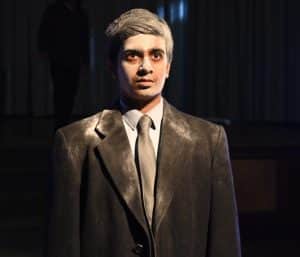 On the day of the performance, which replaced a Year 9 English lesson, Mr Bonham-Carter introduced the occasion, saying that Hamlet is a “play for us all”.
On the day of the performance, which replaced a Year 9 English lesson, Mr Bonham-Carter introduced the occasion, saying that Hamlet is a “play for us all”.
He pointed out that, with theatres nationwide currently lying empty, the audience was very lucky to be able to see actors take to the stage live.
Mr Molloy, who directed Hamlet, said the play had received a great reception from the boys. The audience clearly enjoyed the bloody final fight scene, in which the young Danish Lord, Laertes, kills Hamlet in revenge for the deaths of his father and sister, only then to die himself, having been wounded with the same poisoned sword.
The actors were given a hearty round of applause by their classmates at the end.
“I am so proud of the boys, taking on this epic story and really making it their own,” said Mr Molloy.

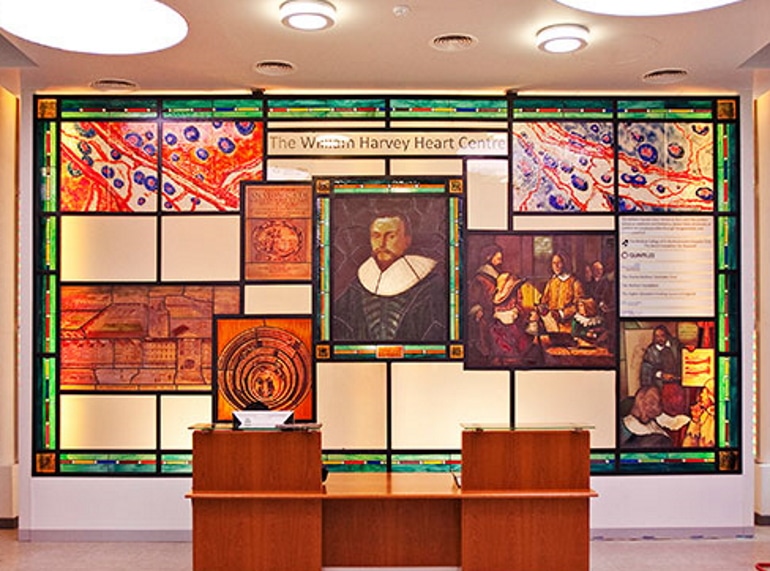
 Head of Year Simon Walker said: “Many of the placements that our Year 12 students worked hard to organise in the previous academic year had to be cancelled due to the lockdown; online work experience has therefore been an important alternative means of enabling them to develop their understanding of workplaces and workplace skills.
Head of Year Simon Walker said: “Many of the placements that our Year 12 students worked hard to organise in the previous academic year had to be cancelled due to the lockdown; online work experience has therefore been an important alternative means of enabling them to develop their understanding of workplaces and workplace skills.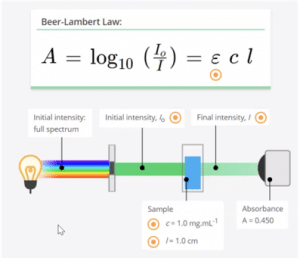 On other days, he was part of smaller groups learning about laboratory skills and mechanisms from a researcher at the institute. “The interactive nature of this made it some of the most enlightening laboratory work experience I have done,” said Mark. The picture here shows a slide used to explain the theory behind some of the laboratory work.
On other days, he was part of smaller groups learning about laboratory skills and mechanisms from a researcher at the institute. “The interactive nature of this made it some of the most enlightening laboratory work experience I have done,” said Mark. The picture here shows a slide used to explain the theory behind some of the laboratory work.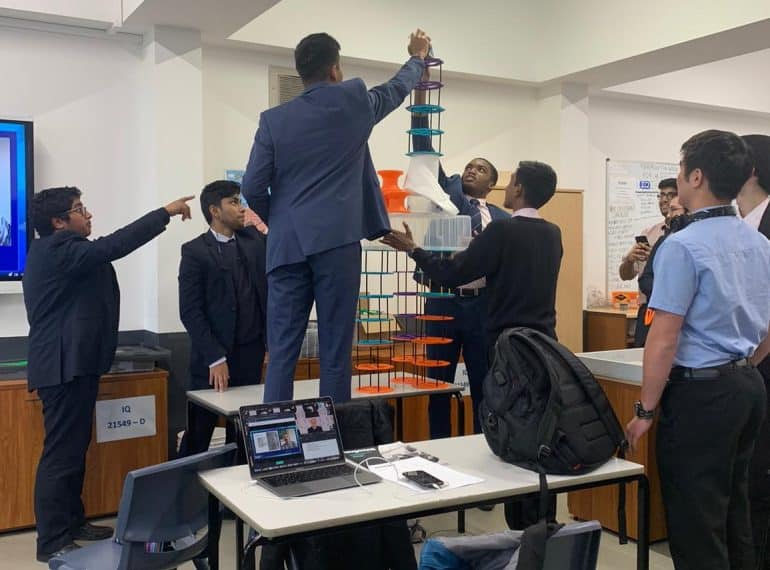
 Sixth-formers have already enjoyed stimulating day-long sessions on Medicine in Action, Chemistry in Action, Product Design in Action and Geography in Action, with a similar event for Biology due to take place in December.
Sixth-formers have already enjoyed stimulating day-long sessions on Medicine in Action, Chemistry in Action, Product Design in Action and Geography in Action, with a similar event for Biology due to take place in December.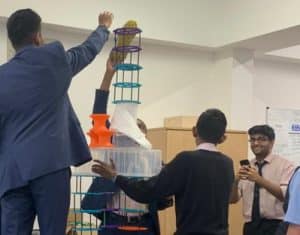 The Resourcefulness and design lecture, delivered by Kingston University Senior Lecturer Pascal Anson, stimulated a practical activity, pictured. “Here we see some examples of structures which were resourcefully developed by the students using VEX IQ and EDR Robotics game elements – great thinking on their feet!” added Mr Noonan.
The Resourcefulness and design lecture, delivered by Kingston University Senior Lecturer Pascal Anson, stimulated a practical activity, pictured. “Here we see some examples of structures which were resourcefully developed by the students using VEX IQ and EDR Robotics game elements – great thinking on their feet!” added Mr Noonan.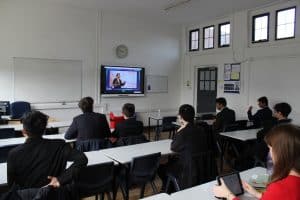 The Geography lectures were similarly wide-ranging. One talk, entitled Lessons in sustainability: An explorer’s tale, was by Jason Lewis, the first person to circumnavigate the earth without using motors or sails. Another featured academic Martin Evans, from the University of Manchester, speaking on Landscape Systems in the Anthropocene. And Emily Parry, Head of Geography, highlighted lectures on water insecurity and on how COVID-19 has impacted the Pacific Islands.
The Geography lectures were similarly wide-ranging. One talk, entitled Lessons in sustainability: An explorer’s tale, was by Jason Lewis, the first person to circumnavigate the earth without using motors or sails. Another featured academic Martin Evans, from the University of Manchester, speaking on Landscape Systems in the Anthropocene. And Emily Parry, Head of Geography, highlighted lectures on water insecurity and on how COVID-19 has impacted the Pacific Islands.
 Year 12’s Aadarsh Khimasia was QE’s delegate at the summit, a week-long series of lockdown-adapted virtual discussions and activities for primary and senior school pupils across the UK organised by the network to raise awareness of sustainability issues. Aadarsh subsequently took part in a
Year 12’s Aadarsh Khimasia was QE’s delegate at the summit, a week-long series of lockdown-adapted virtual discussions and activities for primary and senior school pupils across the UK organised by the network to raise awareness of sustainability issues. Aadarsh subsequently took part in a 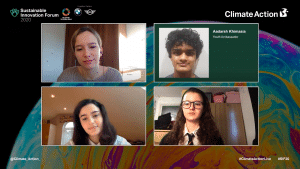 QE Extra-curricular Enrichment Tutor Micah King said: “I’m incredibly proud of Aadarsh, who is using his talents in difficult circumstances to raise awareness of the climate crisis, and our role in combatting it.”
QE Extra-curricular Enrichment Tutor Micah King said: “I’m incredibly proud of Aadarsh, who is using his talents in difficult circumstances to raise awareness of the climate crisis, and our role in combatting it.”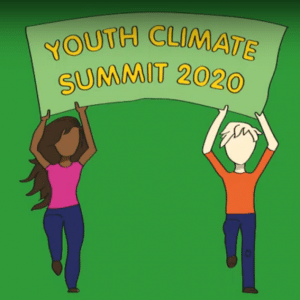 “Our earth is on the brink of irreversible damage putting us and millions of other species here at risk, but strides are being made in the right direction and we need you to help us along the way to a safer, healthier and more sustainable future.”
“Our earth is on the brink of irreversible damage putting us and millions of other species here at risk, but strides are being made in the right direction and we need you to help us along the way to a safer, healthier and more sustainable future.”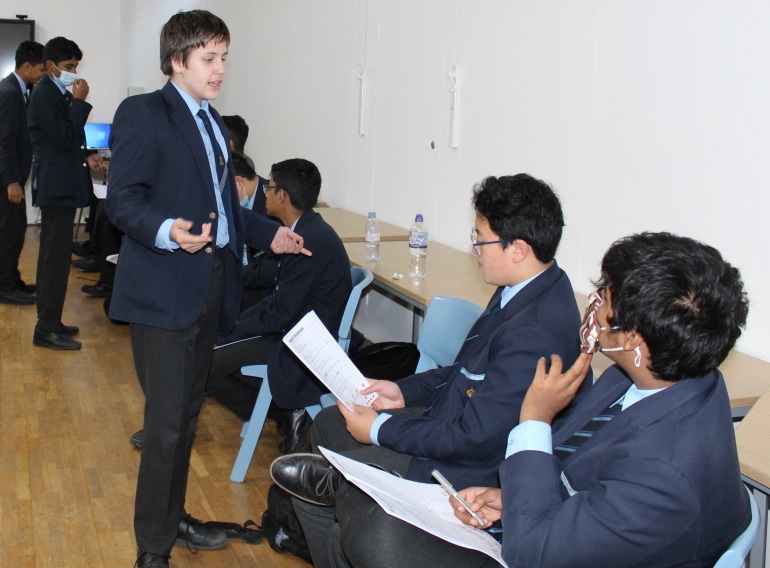
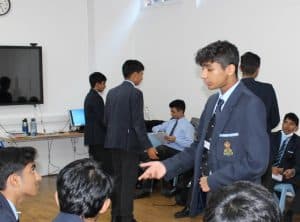 The boys learned about the importance of the three corners of the Communication Triangle – delivery, content and structure – in making a successful speech. They gained insights into overcoming nerves and tips on how to listen and give constructive feedback to each other.
The boys learned about the importance of the three corners of the Communication Triangle – delivery, content and structure – in making a successful speech. They gained insights into overcoming nerves and tips on how to listen and give constructive feedback to each other.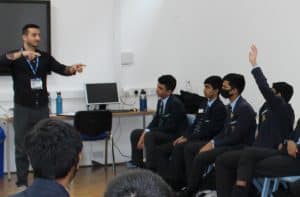 The workshop, which was held in QE’s Conference Centre, included an opportunity for each boy to deliver a speech to the group on any subject of their choice.
The workshop, which was held in QE’s Conference Centre, included an opportunity for each boy to deliver a speech to the group on any subject of their choice.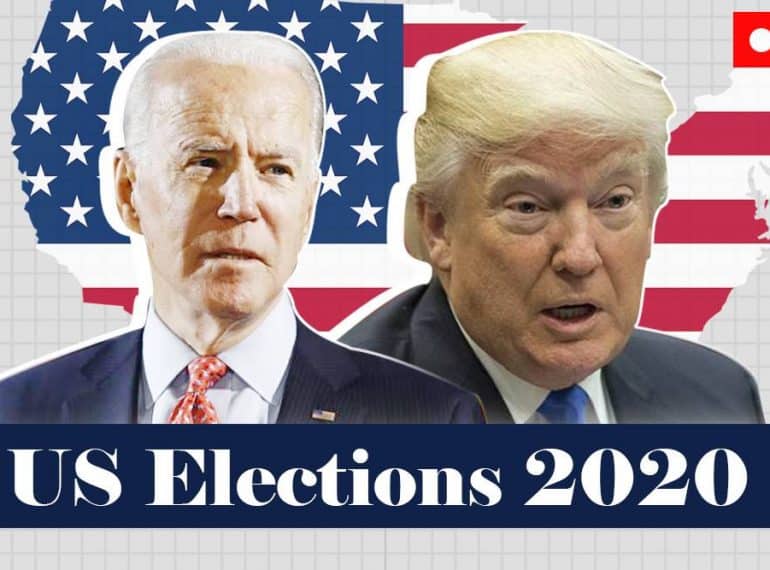
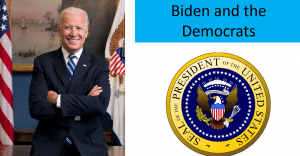 Boys voted in their forms yesterday on their first day back after the holiday, having spent the weeks before half-term finding out more about the two main presidential candidates and the whole American electoral process.
Boys voted in their forms yesterday on their first day back after the holiday, having spent the weeks before half-term finding out more about the two main presidential candidates and the whole American electoral process.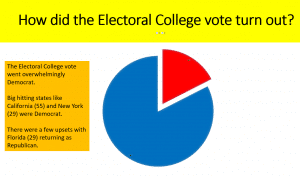 The popular vote was also emphatic: there were 821 votes for the Democrats, compared with just 322 for the Republicans. Of the six year groups voting, only Year 10 voted red (Republican), while Biden swept the board in Year 7.
The popular vote was also emphatic: there were 821 votes for the Democrats, compared with just 322 for the Republicans. Of the six year groups voting, only Year 10 voted red (Republican), while Biden swept the board in Year 7.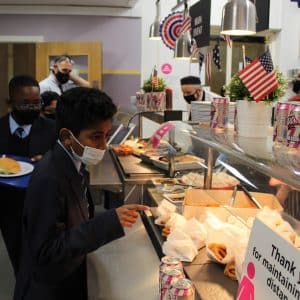 In order to make the experience as realistic as possible, every tutor group was allocated a state. Each had the same number of votes as in the electoral college, ranging from Alaska, Wyoming, Delaware, the District of Columbia, Montana, North Dakota, South Dakota and Vermont, all with just three votes apiece, through to Texas, with 38, and California, with its 55.
In order to make the experience as realistic as possible, every tutor group was allocated a state. Each had the same number of votes as in the electoral college, ranging from Alaska, Wyoming, Delaware, the District of Columbia, Montana, North Dakota, South Dakota and Vermont, all with just three votes apiece, through to Texas, with 38, and California, with its 55.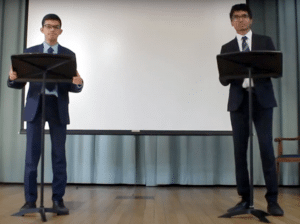 Information and links on the eQE election page included:
Information and links on the eQE election page included: